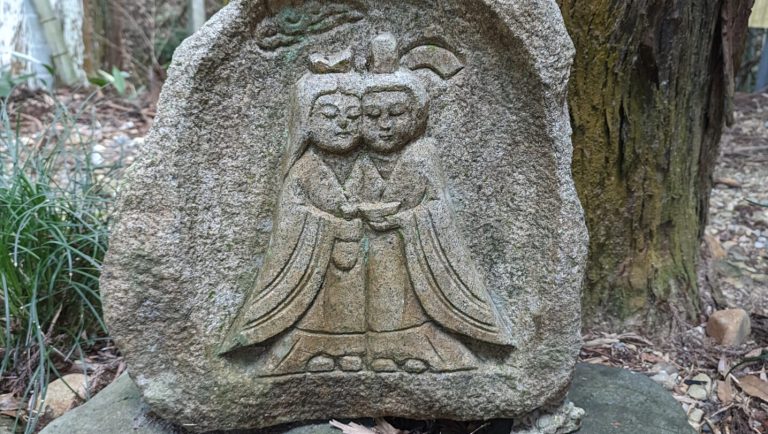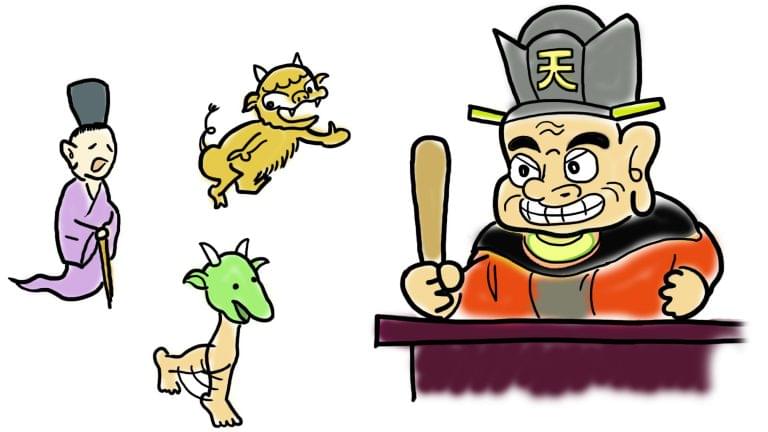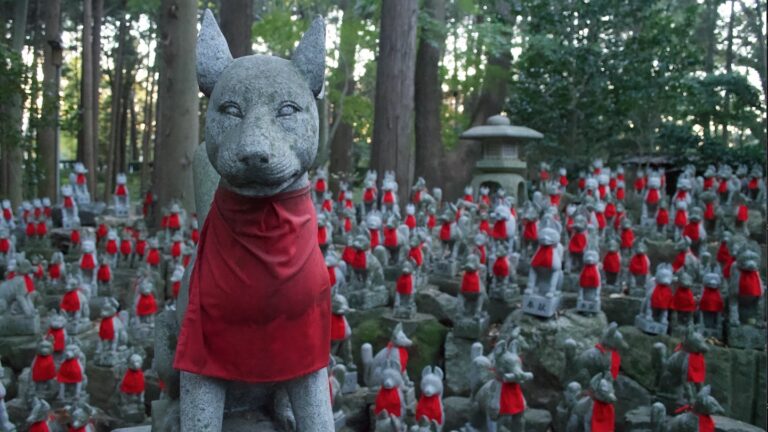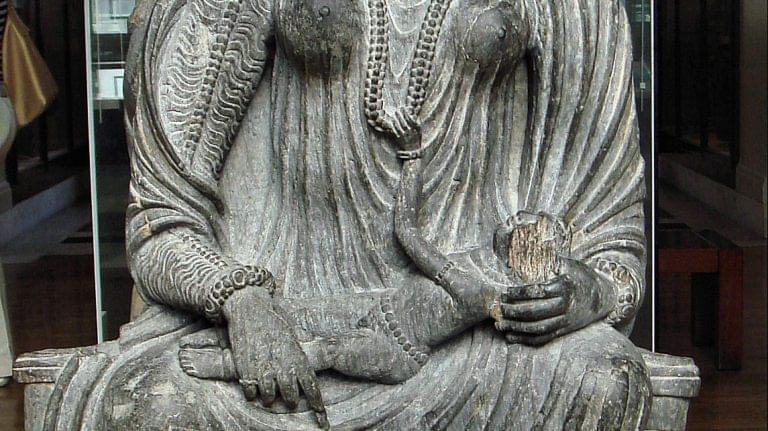This is Thersa Matsuura and you’re listening to Uncanny Japan.
Imagine you’re living in an older Japan.
Life is really hard. No family mart to stop by after work to grab a famichiki or two for dinner.
No vending machines to snag a beer or a pack of smokes.
And when you wake up in the middle of the night and you need to visit the washroom, no heated toilet seats or gentle fountains of pulsating water for your more delicate parts.
The toilets outside in the cold and dark.
And who knows what’s lurking inside.
That’s okay, you say. You’re working for the weekend.
Well, depending on your line of employment, there’s no day off for you, buddy.
Except oshōgatsu, the New Year’s holidays.
You’re allowed to enjoy January 1st, 2nd and 3rd in absolute and exquisite peace.
Oh wait though, there are a couple rules.
Welcome to Uncanny Japan
Would you like to explore the stranger, more obscure corners of Japanese culture?
Dig a little deeper into superstitions, curious customs and all those mysterious creatures that inhabit the land?
If so, then this is the podcast for you.
Uncanny Japan is where I, author Thersa Matsuura, share all the fascinating tidbits I unearth while doing research for my writing.
From the bizarre to the ghastly and everything in between.
I hope you enjoy the show.
Setting the Scene: End of 2022
Hey hey, here it is, the end of 2022.
2023 lurking just around the corner.
Are you excited? Nervous? Scared?
Completely numb to any new and unique hell that might befall us?
Yeah, me too.
Well, actually that, but I’m also a little excited as well.
I’ve got a plan in the works. My personal life goal, if you will, that I’ll announce on the first show next year.
Once it’s officially 2023.
It’s a little bit of a huge goal, but it should amount to a lot of fun, adventure, interesting new content for the podcast, and even more for patrons.
If you follow me on social media, you probably already know what I’m talking about. If not, O tanoshimi ni.
Life in Ancient Japan
Okay, where were we?
Oh yeah, you’re a farmer working dawn to dusk in your sweet potato fields.
Or you’re weaving tabi sandals. Or you’re lacquering umbrellas. Maybe you’re weaving baskets.
Whatever you’re doing, you’re doing a lot of it for many hours a day.
But you’re trying to enjoy life.
Only you have no idea when the next bout of cholera or measles or smallpox is going to sweep through town and wipe out half your friends and family.
I’m not saying you’re ignorant, but science then wasn’t what it is now.
Things like infectious diseases, earthquakes, and weather in general wasn’t quite figured out yet.
So let’s just say this you, this ancient you, were a lot closer to the gods.
Your entire village or city in fact paid very careful attention to the natural world and acted in ways to continue to be favored by certain deities to ensure the safety, health, and long life of your family.
The Toshigami: New Year Deity
Speaking of gods, have you ever heard of the toshigami or ōtoshigami or ōtoshi?
Who also goes by Nigihayahi no Mikoto.
You might be able to guess from that last version of the name that this god is a Shinto kami.
There are some familial intricacies here, but just know that this great age god or great year god will be present at the new year.
There is also the belief that the Toshigami is merely our enshrined ancestor’s spirits visiting again to check up on us and offer some luck and protection.
But only if we obey the six rules of the New Year.
There are six big no-nos for the first three days at the very least.
Just imagine that your house is about to be visited by a very important god.
So with that in mind, here we go.
Rule One: Don’t Clean
For the first three days of the New Year, number one, don’t clean.
And I’m not kidding, don’t clean anything.
This toshigami seems to be a little skittish.
Remember they’ll be packing some good luck.
So if they show up at your house and you’re on your hands and knees scrubbing the tile in the bathroom or slaving over all the dishes your family dirtied in the last ten minutes, or even if you grab that rag to wipe down the table before eating, you’ll shoo the ōtoshi away.
So why risk it?
Especially, using water isn’t good.
Washing dishes, doing laundry, or cleaning the toilet is in effect symbolically washing your luck down the drain.
Speaking of toilet, remember there were no flush toilets back then.
So thank God, or the gods, that you didn’t have to prohibit your entire family from going to the privy for three days.
There’s also an old saying that goes, Don’t hang your futon out on New Year’s Day.
So even that’s not allowed.
Whatever You Do on January 1st
The way it was explained to me by my mother-in-law is whatever you’re doing that first day of the year, well, that’s what you’re going to be doing the entire rest of the year.
So if you’re waiting on your family hand and foot or busting your butt to make the perfect dinner, that’ll be your every day for an entire year.
If, however, you’re completely relaxing, content, and peaceful, enjoying your family, maybe even having a little sip of otoso, which is spiced sake that you get to drink at New Year’s, and you’re ready to welcome that toshigami with open arms, then that will be your coming year.
My mother-in-law also told me that women especially enjoyed o shougatsu, because they could actually finally rest for a few days and not be made to feel bad about it.
Rule Two: No Knives or Sharp Blades
Number two, don’t use knives or sharp blades for anything.
There are different reasons this might have been a thing.
Here are a couple.
First, there was a saying, another one, that went something like, If you don’t use any sharp instruments for the first three days of the New Year, then you will enjoy an entire year with no accidents and in good health.
Worth it.
Remember that you’ve been plugging away cleaning and cooking before the first of January.
Remember ōsōji, the big cleaning, and osechi, New Year’s cuisine.
You’ve already got your ozōni, New Year’s mochi soup ingredients, cut and ready to toss into some dashi broth.
And of course, your osechi ryōri is not only cooked, but artfully placed in your fancy lacquered jūbako, or bento-like boxes for New Year’s.
So tomorrow, on the first, all you have to do is take the jūbako, open the lid, and everyone can eat.
A Personal Story About Osechi
A personal story.
My mother-in-law used to keep the osechi jūbako in the coldest room in the house, which just happened to be the next room over because all the rooms were cold, except the one we were in.
Then, whenever anyone was hungry after the initial breakfast of osechi, someone was designated to fight the cold and go grab the jūbako.
By day three, everything is picked over, and you pretty much just wait for someone to slap some mochi cakes on the fire, so you can eat them with sprinkled sweet kinako soybean powder, or in azuki bean soup, or any way you want, because nobody wants to eat that last bite of vinegar daikon radish and carrot, or tiny candied sardines, even my Japanese family.
Don’t Cut Your Nails
Back to not using bladed objects.
Another tradition says don’t even cut your nails.
Again, that’s a sharp thing, and it will lead to, or in the very least, symbolize cutting ties with your family, which isn’t good.
Or, hey, depending on your family, maybe you want to cut your nails on January 1st, and 2nd, and 3rd.
Rule Three: No Fire or Flame
Number three.
On New Year’s, don’t use any kind of fire or flame.
Aku.
This is something I’ve always wanted to talk about.
When boiling something in Japan, a substance called aku is released.
I mean, it’s not just Japan, it’s released everywhere, but you’ll find it mentioned quite a bit in Japanese recipes or cooking shows.
Aku is basically that scummy stuff that comes off meat or even vegetables.
I guess anything you boil.
And aku tastes bad, so you’ll be asked to skim it off if you’re following a recipe.
Aku with different characters means bad or evil.
So follow me here.
Aku coming out of some boiled food is reminiscent of bad or evil coming out of something.
And that’s something you don’t want on New Year’s.
You don’t want bad or evil coming out of anything.
It’s very inauspicious.
The Fire God Kōjin Needs Rest
And you don’t want to use your stove either.
There is a god of fire called kōjin.
This kōjin protects your house and your family and does that every day of the year relentlessly.
So for a couple of days in the year, let’s let old kōjin rest.
If you don’t, if you’re busy cooking and stoking the fire, the god could get angry with you.
And who knows what will happen.
It’s a good idea not to upset a fire god, just saying.
The consensus seems to be to let kōjin rest for three days, the first, second, and third.
You can fire up the stove on the fourth day of the year.
Rule Four: No Four-Legged Animals
Number four.
Don’t eat any animals with four feet.
No pork, beef, horse, and what have you.
Seems like there are a lot of different ideas about where this one came from.
But it seems quite a bit back in the day, meat was avoided even in osechi ryōri, the New Year’s food.
Also possibly is Buddhism’s influence.
Don’t eat meat.
And I guess Emperor Tenmu issued a ban on eating meat by monks, and somehow that spread to everyone else, at least during the first few days of the New Year.
I’m not sure.
But I can tell you, if I’m not allowed to use fire to heat my food, and I don’t have good refrigeration, then I’d rather eat some sweetened chestnuts than a piece of meat that’s been sitting in the next room for three days.
So it could be this belief was started as a way to keep people from getting sick.
Rule Five: No Fighting
Number five.
No fighting.
The beginning of the year is a happy, hopeful, and relaxing time.
It’s a fresh start.
Also when the god, again, toshigami, or gods, those ancestors, are checking you out and deciding your fortune for the coming year.
Best to be smiling and even-tempered.
Be a good host.
Show the gods that you’re worthy of abundant health and fortune.
Rule Six: Don’t Use Money
Number six.
Don’t use money.
There is an exception here, but basically, if you’re spending a bunch of money those first few days of the year, then that’s the direction you’re headed for every day after.
Spending too much money and you won’t be able to save anything for future years.
Bad habits and all that.
However, the gods will make an exception.
If you’re making an offering to them, that is.
Specifically, any donations to shrines or temples, they’re a pass.
So knock yourself out.
Modern Practice and Creative Loopholes
So there you go.
Six prohibited activities for the first three days of the New Year.
But there is some good news.
Most people nowadays not only don’t practice these, they probably couldn’t name all six.
I think the one that I did know about was the first one.
No cleaning.
And well, no cooking.
Although my mother-in-law did fire up the gas range to make the ozōni soup.
So even she didn’t obey all these.
So you’re safe too.
It was funny to read the comments to these old-timey oshōgatsu rules.
Someone said that they had an IH stove, so that wasn’t actually using fire.
So they were safe on that one.
Another said that they would use denshi money, electric money, various accounts connected to your phone.
I have no idea what you call that in English.
So since there’s no real money that was changing hands, they weren’t breaking any rules there either.
Anyway, these are difficult to obey, as you can imagine.
But not cleaning and not using knives, I can see.
No fighting doable.
Even not using money.
Especially as the New Year’s soup, ozōni, is quite popular all over Japan.
And even if you cut up all the vegetables and mochi beforehand, you still need to heat up the pot.
Not eating four-legged animals can be pulled off except for yakibuta or ham, which has kind of become a New Year’s osechi staple, I’ve noticed.
So what I’m trying to say is, as much as possible, if you can, no stress if you can’t, just spend those early January days relaxing and taking care of you.
Be a little aware, though, because at some point that toshigami will sneak up and pay you a visit.
And when it does, you’ll want to show what an affable, awesome person you are.
Absolutely deserving of the copious amounts of good luck, heaps of health, and oodles of wealth they will no doubt bestow upon you.
Closing and New Year Plans
Okay, that’s it for today.
Thank you to every single listener out there, every single patron and supporter of the show.
Richard and I are going to joya no kane, the midnight ringing of the temple bell, on New Year’s Eve.
As well, we’re going to visit the first sunrise, which will have dancing and singing.
So watch out for soundscapes and a little photo and video montage that I’ll be putting up on Patreon for all the tears.
Plus, I’m kind of feeling like I want to experiment with mochi, so there might be some interesting mochi recipes going up in January, too.
If you’re not already a patron and you’d like to be, please consider that.
Just do a search for Patreon and Uncanny Japan.
Okay, this wraps it up for season six.
It has been so lovely to talk to you and with you as the case may be.
I’m looking forward to hanging out with you all again next year.
Thank you, Richard, for doing the sound, the website, and the YouTube work for the show.
And thank you patrons and supporters for keeping Uncanny Japan and me personally going.
I’m wishing every single one of you an incredible, healthy, happy, and holy 2023.
Yoi o-toshi o. Talk to you next year. Bye bye.
Credits
Intro and Outro music by Julyan Ray Matsuura
Koiwazurai by PeriTune







あけましておめでとうございます。本年もよろしくお願いします。
This episode was really interesting. I’d heard about the no cleaning and cooking thing, but not the other prohibitions.
Wishing you peace, health, success and happiness in 2023!
明けましておめでとうございます🙏 Me, too! Those were the only two I had heard of before. It looks like no one practices them anymore…well, not the No Cooking/Using Fire, for sure.
All the best to you, too, a year full of love, health, joy, and wicked success!